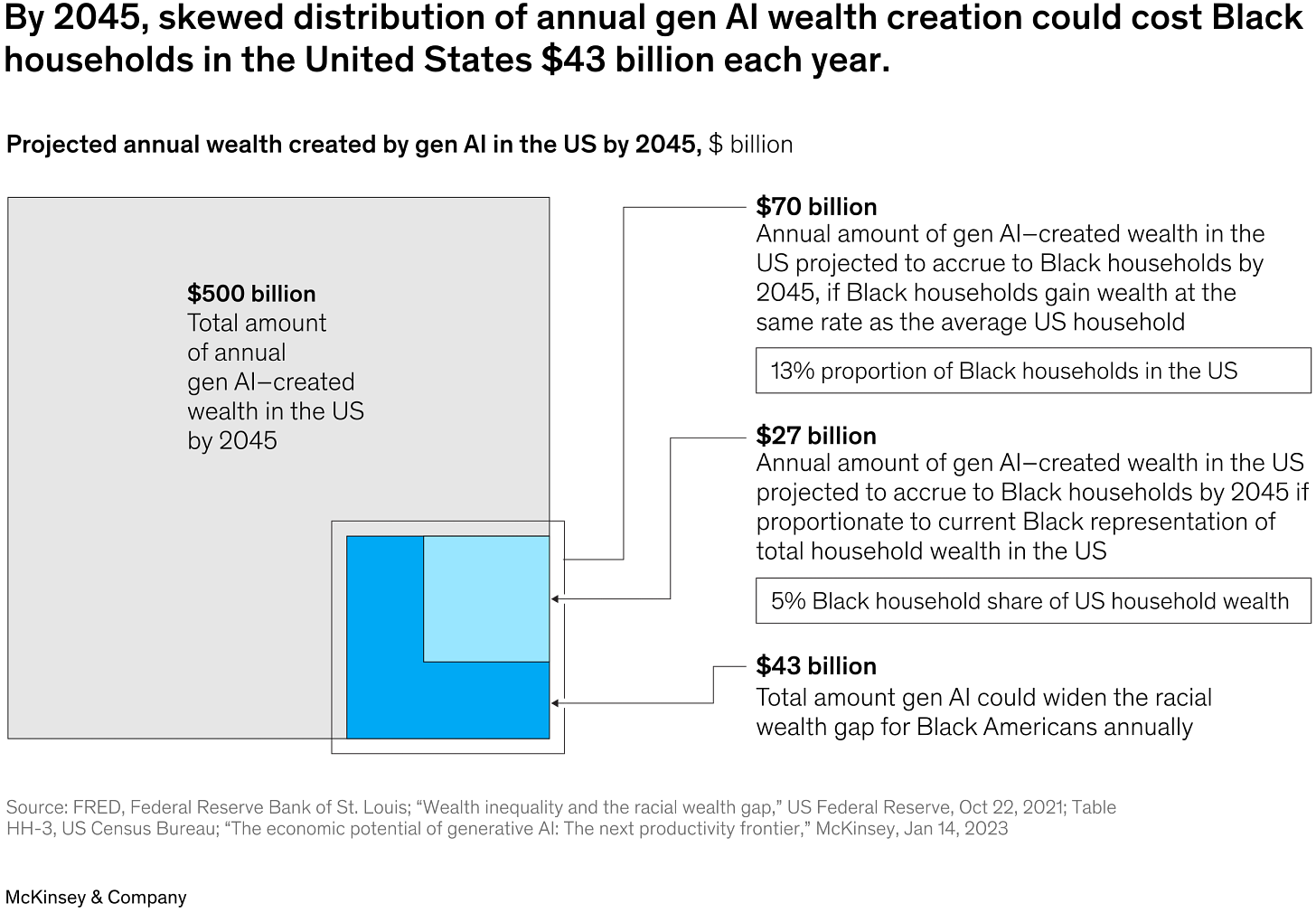Bridging the Racial Gap: The Ethical Imperative of Generative AI
Inclusive AI deployment can empower underserved communities and foster economic equity
This issue departs from the series of AI marketing ethics questions to examine a critical issue — the disparity of technology to cause a racial divide and how the thoughtful use of generative AI can bridge that gap.

Recently, I came across a December 2023 McKinsey report highlighting the dual potential of generative AI to either exacerbate or mitigate economic disparities affecting Black communities in the United States.
The report projects that gen AI could widen the racial wealth gap by $43 billion annually if existing inequities persist. This stems from the fact that Black Americans currently capture only about 38 cents of every dollar of new household wealth despite representing 13% of the U.S. population. Without intervention, this trend could continue, leading to a significant increase in the wealth gap between Black and White households by 2045, McKinsey said.

Not only that, but Black workers are also overrepresented in occupations susceptible to automation, such as office support, production work, food services, and mechanical installation and repair.
Approximately 24% of Black workers are in roles with over 75% automation potential, compared to 20% of White workers. This disparity raises concerns about job displacement and economic vulnerability within Black communities.

However, the article emphasizes that organizations can harness AI with thoughtful deployment to remove barriers to Black economic mobility. Strategies include targeted reskilling programs to prepare Black workers for emerging roles in the AI-driven economy and ensuring equitable access to AI technologies.
Gen AI can be a tool for promoting economic inclusivity and helping close the racial wealth gap by proactively addressing these challenges.
Intentional and inclusive approaches in developing and implementing AI technologies can prevent deepening disparities and foster equitable economic growth.
Gen AI can be a tool for promoting economic inclusivity and helping close the racial wealth gap by proactively addressing these challenges.
5 Keys to AI’s Ethical Potential
The report promises to remove barriers and underscores organizations' ethical responsibility when deploying generative AI technologies; it provides a roadmap for how ethical AI practices can drive equity rather than exacerbate disparities:
1. Avoid Harm and Reducing Bias
The report highlights how generative AI could widen the racial wealth gap if inequities persist. Addressing this requires organizations to embed ethical frameworks into AI development and ensure systems are designed to minimize Bias and avoid reinforcing existing systemic inequalities.
2. Promote Fairness and Inclusion
The overrepresentation of Black workers in roles susceptible to automation emphasizes the need for fair and inclusive workforce planning. Ethical AI practices involve proactively reskilling these workers for emerging opportunities, thus promoting economic mobility rather than displacement.
3. Provide Equitable Access to Technology
A key ethical imperative is ensuring that Black communities have access to the benefits of generative AI. This includes fostering education, training, and entrepreneurship opportunities in AI-related fields, which can help close the racial wealth gap and empower marginalized groups.
4. Take Proactive Responsibility
Organizations have a moral obligation to anticipate and address the societal impacts of their technologies. By creating targeted initiatives to prepare underserved communities for the future of work, companies demonstrate ethical leadership and contribute to a more inclusive economy.
5. Promote Collaboration and Advocacy
The report calls for intentional strategies to remove barriers to economic mobility, which aligns with the ethical principle of collective action. Collaboration among governments, companies, and community organizations can ensure AI technologies benefit all populations equitably.
Examples of Successful Organizational Initiatives
Google’s ‘Grow with Google’ Initiative
Google’s "Grow with Google" program provides free training, tools, and resources to help underrepresented communities, including Black Americans, gain digital skills and access high-growth career opportunities. The initiative has partnered with organizations like the National Urban League to deliver training in AI, data analytics, and other tech-related fields.
Impact: According to Google, the program has trained over 100,000 Black Americans in digital skills, helping them transition into tech roles or start their own businesses.
IBM’s SkillsBuild Program
IBM’s SkillsBuild program provides free AI and tech training to underrepresented communities, including Black workers. The program offers AI, cloud computing, cybersecurity, mentorship, and job placement support courses.
Impact: IBM reports that over 50% of SkillsBuild participants come from underrepresented groups, and many have successfully transitioned into tech roles.
The Hidden Genius Project
The Hidden Genius Project is a nonprofit organization that trains Black male youth in technology, entrepreneurship, and leadership skills. The program includes intensive coding boot camps, mentorship, and exposure to AI and machine learning.
Impact: Since its inception, the program has trained over 10,000 young Black men, many of whom have pursued careers in tech or launched their own startups.
Other examples include:
In Summary
The McKinsey report emphasizes that ethical AI isn't just about preventing harm but actively driving positive societal change. By addressing disparities through inclusive design, equitable deployment, and proactive upskilling, generative AI can become a force for social good rather than a tool that deepens inequality.
Leave a comment and share your thoughts on how organizations can use AI to bridge the racial divide instead of exacerbating it.
More on this topic:
AI equity: Ensuring access to AI for all (Gates Foundation)
AI Replacing Jobs: Addressing the Impact on Communities of Color (Data Science Dojo)
AI For Equity: Bridging Racial Gaps With Artificial Intelligence (Forbes)
Exploring the Impact of AI on Black Americans (PDF) (Stanford University)
Take advantage of these AI Marketing Ethics opportunities:
Wondering how to get started with AI? Read our AI Marketing Ethics 101 series.
Want to train your marketing team on AI ethics? Learn more here.
Need marketing ethics resources (guides, policies, etc.)? Find them here.
Seeking an AI marketing ethics expert to speak at your next event? We got you.





I LOVED this article Paul.
This is a big topic for me and a concern.
You highlighted huge stakes when it comes to AI and its potential impact on economic inequality. It’s clear that AI can either be a tool for growth or further division. Ensuring equitable access and reskilling initiatives is key, but the real challenge lies in making sure these solutions actually reach the communities that need them most. The conversation about ethics in AI is only just beginning and I am so darn happy we are having them.